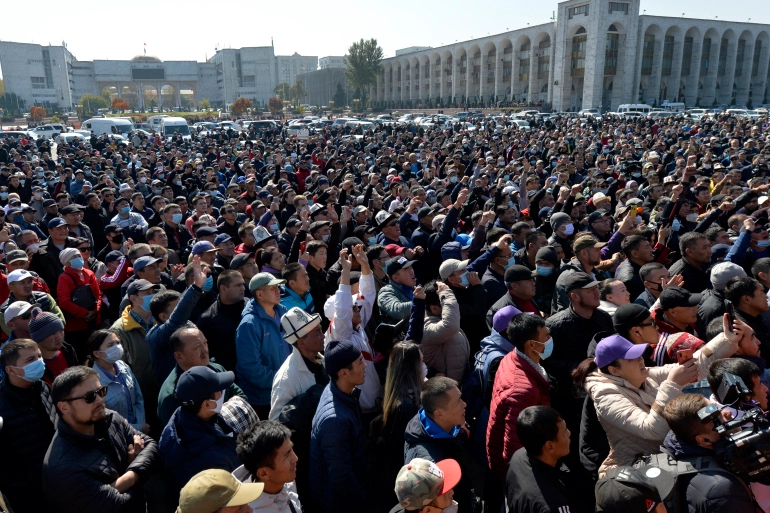Unrest following a disputed parliamentary election has resulted in a power vacuum, and significant challenges remain.

It was meant to be a free and fair parliamentary election that could have changed Kyrgyzstan’s political landscape.
New political parties had mushroomed and promised new politics, free from the alleged corruption and clientelism of the ruling elite.
“These elections are taking place under conditions of strong political competitiveness,” President Sooronbay Jeenbekov said after casting his vote on October 4. “All parties were given equal opportunities.”
But the four main parties which made it to parliament represented the old generation of politicians. To many, the result was proved electoral fraud.
Kyrgyzstan, which over the past 15 years has seen two revolutions that toppled elected leaders, did not see another political upheaval coming.
Protests which began after the Central Election Commission announced the results, however, led to the biggest turmoil in 10 years and left the country in chaos.
While the results were soon annulled, at the time of writing it was still unclear who would preside over the interim parliament that will lead the nation to the next election.
The events took most commentators by surprise. But for the Kyrgyz public, the reasons behind the third revolution in the country’s 29-year history are clear.
Expectations were high. New politicians were hoped to bring change, free from oligarchic connections and wealthy powerful clients, at a time of need, during the pandemic, which has exposed the government’s ills.
People were tired.
Alleged corruption among the elite has been openly discussed on social media.
Notably, the Matraimov family, the main sponsor of the Mekenim Kyrgyzstan party – which won a quarter of the vote, became the protagonist of a series of investigations by OCCRP, Kloop, RFE/RL’s Radio Azattyk, and Bellingcat, revealing the scope of alleged corruption and illegal business practices of their members, many of whom still hold public posts.
The mismanagement of the coronavirus pandemic, which has hit the economy, fuelled dissent. But the ruling powers mobilised to stay in power.
This election saw an unprecedented use of administrative resources, which is a term used to describe the pressure exercised on government employees to vote in favour of the ruling party, in this case – Birimdik.
Reports of vote buying were also widespread.
Voters, impoverished by the economic downturn, were reportedly offered even $25 to cast their votes in favour of the main parties, according to the Kloop news site, which published the footage of a voter accepting the bribe.
The Mekenim Kyrgyzstan party, sponsored by Rayimbek Matraimov, was reportedly eager to pay for votes.
But in contemporary Kyrgyzstan, where social media plays an increasingly potent role and young leaders and political figures can easily influence public opinion, electoral fraud is impossible to hide.
Kyrgyz society is politicised and dynamic and, unlike its neighbours, also used to political upheaval.
This time, however, the revolution is taking place not only on the ground but also online.
Compared with the revolt of 2010, in 2020 Kyrgyz society is better informed and hungry for change.
But the elite will fight to preserve the status quo.
It remains to be seen who will win.


